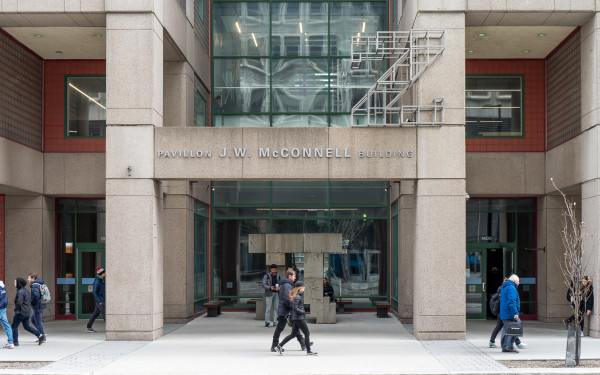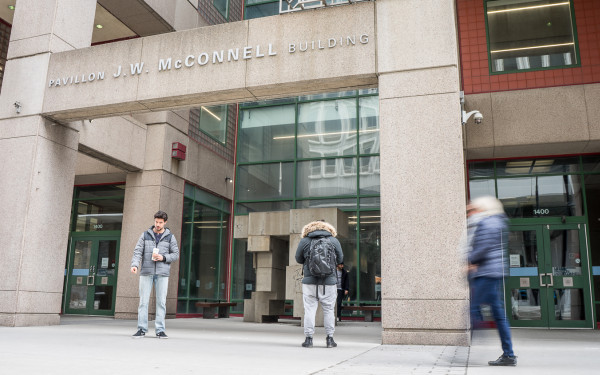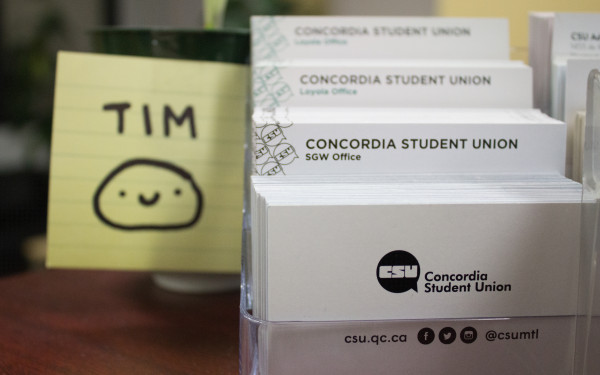“Criminally negligent”: CSU scolds administration’s return to campus plan in town hall
Lack of N95 masks, hybrid learning, support for students with disabilities were discussed at length
Concordia student Crystal Sayers is currently sick with COVID-19. “I still have to go to class—I’m really worried about putting all my classmates at risk. But according to the regulations, I only had to isolate for five days,” she said, sobbing and coughing during the Concordia Student Union’s Zoom call. A town hall was hosted by the CSU regarding COVID safety and the return to campus.
The meeting, hosted virtually on Feb. 15, was broken up into four segments: hybrid delivery, academic accommodations, safety on campus, and communications on decision-making.
Many expressed frustration at the Concordia administration’s silence on safety failures following students’ return to in-person classes. Dean of Students Andrew Woodall was present during the town hall, but was unable to give clear responses to most questions he was asked.
The CSU’s demand for N95 masks took up considerable time during the town hall. The demand was included in the union’s open letter published at the beginning of the winter 2022 semester, yet no N95 masks have been made available by the university. Because of this, the CSU has taken matters into its own hands.
The union has created an online form that allows students to pick up N95 masks after registering for them. They are available at the CSU office (H-7.11), located on the seventh floor of the Hall building. The CSU has also partnered with the Teaching and Research Assistants at Concordia union and the Arts and Science Federation of Association to create a contact tracing system for coronavirus cases.
Tom Fraser, TRAC’s grievance officer, spoke of how challenging the return to campus has been for the bodies representing students’ interests to adequately meet their safety needs. “We’ve been put in a position where we have to fill in this gap because Concordia is not. We are a labour union and students’ union. We do not have the resources to do this on any real sustainable scale.”
Hannah Jamet-Lange, the CSU’s academic and advocacy coordinator, spoke on the university’s lack of transparency. They said the union was notified the Concordia Board of Governors had received and discussed the open letter.
“However, that discussion took place in closed session. So we actually don’t know what was discussed. For us, that shows that the university is putting its reputation above the wishes of students,” they said.
“We’re paying thousands of dollars for an administration that is doing what is essentially criminally negligent—nothing. There are no real protections for us,” said Connor Bye, student and representative from Socialist Fightback.
Safety was the top priority of the evening as students shared their experiences back on campus. Student Ariella Pardo noted the state of sanitation in some of her classes was below abysmal. “When I got to my classroom, the classroom was a mess. There were broken masks all over the table. And it was already a small classroom. We're 25 students in the classroom—we were sitting like sardines.”
Several students lamented that very few classrooms are equipped with disinfectant wipes, paper towels, or tissues. It was also noted that the visible presence of security guards on campus has been greatly reduced since the start of the semester.
Another concern was the administration’s refusal to entertain hybrid learning. Many professors have gotten creative in spite of this. Students spoke in the chat of professors in the Simone de Beauvoir Institute, journalism department, sociology department, and others, being very adaptable and comfortable in the switch to a hybrid model.
Viki Bristowe, one of several students with disabilities present at the town hall, commented on the ableist nature of these decisions. “Accessible learning, including hybrid learning and expanded accommodations, have been something disabled students have been told for years wasn’t a possibility logistically,” she said. “COVID, however, proved that this was just in fact a matter of willingness, and that it is absolutely possible. We have the tech, we just don’t have an administration that cares about disabled and immunocompromised students.”
The Link asked Woodall whether administration higher-ups had also made a return to campus in light of these measures. He was unable to answer quickly, stuttering and walking back on his answer. “I don’t really know… I think most of them are in at least part-time, I don’t know. Most of them are in part-time—if not all the time.”
Woodall was prompted by CSU campaigns assistant Julianna Smith to list what he had taken away from students’ stories and experiences. “That’s a good question, I’m not totally sure. I’m going to check in with security and find out what happened to [guards doing mask and hand sanitizer checks at] the front doors. I wonder if anyone ever thought about getting Concordia on the list for rapid tests. The wipes in the library and the classrooms, that’s something I never heard about.”
In the final minutes of the meeting, The Link asked students to rate the university’s performance since the return to campus from 1 to 10. Responses ranged from seven, to three, to an array of zeroes, as well as several comments reading “[negative] infinity” and “can I give a minus?”

_900_642_90.jpg)




